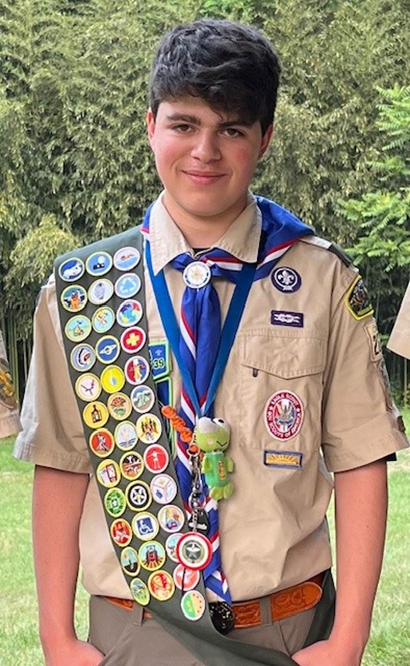By Peggy Eppig, Environmental Educator
Conservation is not the work of just one generation. Lancaster Conservancy is excited to provide ways for our expert staff to connect with future professionals through opportunities like Seasonal Stewardship Crews and Scout projects. The Lancaster Conservancy is able to work with two youth leadership approved capstone projects each year. Students with interests in conservation careers can get involved in a project that addresses a need in biodiversity conservation, forest health, and conservation education. These projects help students acquire essential skills in conservation work as well as working knowledge of the ethic that guides most critical landscape restoration and protection efforts today.
Student conservationists who choose to work with Lancaster Conservancy for a course capstone project or an organizational leadership award know how much work goes into just one conservation project. Scouts Mal Barber and Jack Korba experienced firsthand the challenges and rewards of leading projects for pollinator habitat restoration and enhancement.
Mal earned the Girl Scout Gold Award for her “bee hotel” behind the Russo Barn at Climbers Run Nature Center, completed an Eagle Scout Service Project at Kellys Run Nature Preserve for pollinator habitat enhancement, and earned the BSA Distinguished Conservation Service Award for a native shortgrass and wildflower meadow restoration at Climbers Run.
Jack Korba completed his Eagle Scout Service Project with the construction of a set of cavity nesting houses for native bees to be installed around the perimeters of two in-progress meadow restorations at Kellys Run and Climbers Run preserves.
 Mal Barber
Mal Barber Jack Korba
Jack KorbaBoth Mal and Jack began their projects by meeting with Lancaster Conservancy staff to discuss their ideas and learn more about how their proposed projects would fit into the Conservancy’s restoration efforts and management plans. They worked closely with a staff member to develop the project and learn all they could from them and other conservation sources about the habitat, plants, and animals they wanted to help with their work.
Mal and Jack have the following advice for other young conservationists interested in taking on these kinds of projects:
- Be prepared to serve as the primary lead for sourcing and funding materials and for organizing volunteer labor to help with construction and installation of the projects.
- It is important not to underestimate the amount of time working on an outdoor project will take, especially when it comes to site preparation. You must understand that the timing of plant, animal, and insect conservation projects is influenced by seasonal weather and the fluidity of site management work conducted by Conservancy land stewards.
- Be flexible and ready to adjust plans and activities to accommodate nature and shifting management priorities; be patient if poor or changing conditions stall the work; and be ready to take advantage of those work windows when they open!
- Conservation projects are great ideas for fulfilling top honor capstone awards, but these kinds of projects require a unique set of leadership skills that include having nature itself on your team. Conservation leadership acknowledges that nature may or may not be as cooperative or as timely as you hope it might be and that the entire project may need to flex and adjust to this sometimes-unpredictable-but-ultimately-appreciative team member.
Lancaster Conservancy is thankful for Mal and Jack’s work to help restore and enhance sites for the conservation of native pollinators! The world needs more conservation biologists and ecologists. The work of stewardship professionals and habitat restorationists is essential for our natural world, and the Conservancy is grateful to be able to facilitate the growth of the next generation of conservation.









